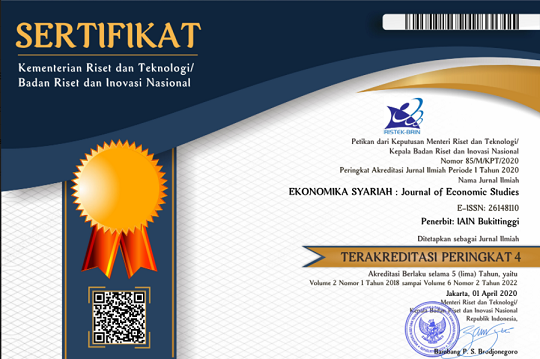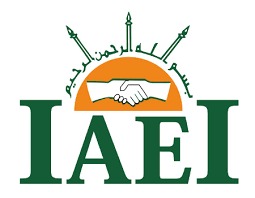Fenomena Manajemen Laba Pada Perbankan Syariah di Indonesia dan Tindakan Mitigasinya
DOI:
https://doi.org/10.30983/es.v3i2.2553Abstract
References
Alzoubi, Ebraheem Saleem Salem. 2018. Audit quality, debt financing, and earnings management: Evidence from Jordan. Journal of International Accounting, Auditing and Taxation
Abdelsalam, Omneya, Dimitropoulos,Panagiotis, Elnahass, Marwa and Leventis,Stergios. 2016. Earnings management behaviors under different monitoringmechanisms: The case of Syariahic and conventional banks. Journal of Economic Behavior and Organization 132
Earnings management behaviors under different monitoringmechanisms: The case of Syariahic and conventional banksOmneya Abdelsalama, Panagiotis Dimitropoulosb,∗, Marwa Elnahassc,Stergios LeventisdaDurham
Alam, Mohammad Nurul. 2013. Corporate governance in Syariahic perspective. International Journal of Syariahic and Middle Eastern Finance and Management. Vol. 6 No. 3,
Dechow,P.,Ge,W.,Schrand,C.2010.Understanding earnings quality. Journal of accounting and economics
DeAngelo, L. E. 1981. Auditor size and audit quality. Journal of accounting and economics,
Ginena, Karim. 2014. Sharī‘ah risk and corporate governance of Syariahic banks. Emerald Group Publishing Limited.
Francis, J. R., & Wang, D. 2008. The joint effect of investor protection and Big 4 audits on earnings quality around the world. Contemporary accounting research
Gilson, R. J. 2006. Controlling Shareholders and Corporate governance : Complicating the Comparative Taxonomy. Harvard Law Review
Healy, P. M. and Wahlen, J. M. 1999. A Review of the Earnings Management Literature and Its Implication for Standard Setting. Accounting Horizon. Vol. 13: 365-383.
Habbash, Murya and Alghamdi, Salim. 2015. The perception of earnings management motivations in Saudi public firms. Journal of Accounting in Emerging Economies
Habbash, Murya . 2017. Audit quality and earnings management in less developed economies: the case of Saudi Arabia. Joutnal of Management and Govermet
Houqe, Muhammad Nurul, Ahmed, Kamran and Zijl, Tony van. 2017. Audit Quality, Earnings Management, and Cost of Equity Capital: Evidence from India. International Journal of Auditing
La Porta, R., Lopez-De-Silanes, F., Shleifer, A. and Vishny, R.W. 2000. Agency Problems and Dividend Policies Around the World. The Journal of Finance. Vol. 55: 1-33.
Lassoueda,Naima., Attiab, Mouna Ben Rejeb., and Sassic, Houda. 2018. Earnings management in syariahic and conventional banks: Does ownership structure matter? Evidence from the MENA region. Journal of International accounting
Lin, J., and Hwang, M. (2010). Audit quality, corporate governance , and earnings management: A metaanalysis. International Journal of Auditing
Lo, Kin. 2007.Earnings Management And Earnings Quality. Journal of Accounting and Economics
Loius , Henock dan Robinson, Dahlia. 2015. Do managers crediblyuse accruals to signal private information? Evidence from the pricing of discretionaryaccruals around stock splits$. Journal of Accounting and Economics
Mollah, S., Zaman, M., 2015. Shari'ah supervision, corporate governance and performance: conventional vs. Syariahic banks. J. Bank. Financ
Safieddine, A., 2009. Syariahic financial institutions and corporate governance : new insights for agency theory. Corp. Gov
Quttainah, Majdi A., Song, Liang and Wu, Qiang. 2013. Do Syariahic Banks Employ Less Earnings Management. Journal of International Financial Management & Accounting.
Reichelt, K. J., and D. Wang. 2010. National and office-specific measures of auditor industry expertise and effects on audit quality. Journal of Accounting Research
Roychowdhury, S. 2006. Earnings Management Through Real Activities Manipulation. Journal of Accounting and Economics.
Watt, R. L. and Zimmerman, J. L. 1990. Positive Accounting Theory: A Ten Year Perspective. The Accounting Review
Zainuldin, Mohd Haniff and Lui,Tze Kiat . 2018. Earnings management in financial institutions: A comparative study of Islamic banks and conventional banks in emerging markets. Pacific-Basin Finance Journal
Downloads
Additional Files
Published
How to Cite
Issue
Section
Citation Check
License
Authors who publish with this journal agree to the following terms:
- Authors retain copyright and grant the journal right of first publication with the work simultaneously licensed under a Creative Commons Attribution-ShareAlike 4.0 International License that allows others to share the work with an acknowledgment of the work's authorship and initial publication in this journal.
- Authors are able to enter into separate, additional contractual arrangements for the non-exclusive distribution of the journal's published version of the work (e.g., post it to an institutional repository or publish it in a book), with an acknowledgment of its initial publication in this journal.
- Authors are permitted and encouraged to post their work online (e.g., in institutional repositories or on their website) prior to and during the submission process, as it can lead to productive exchanges, as well as earlier and greater citation of published work (See The Effect of Open Access).





